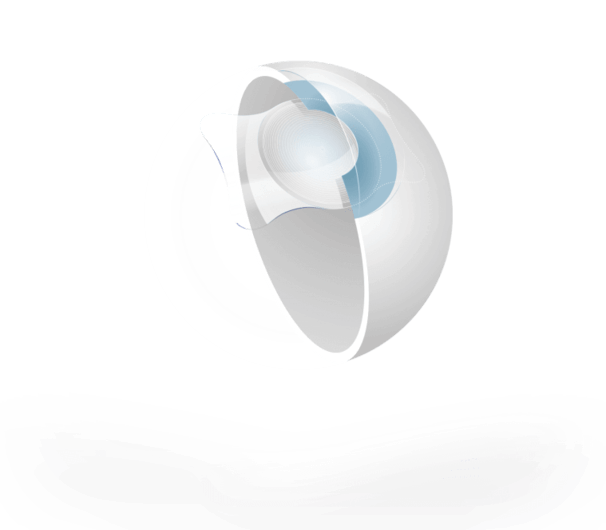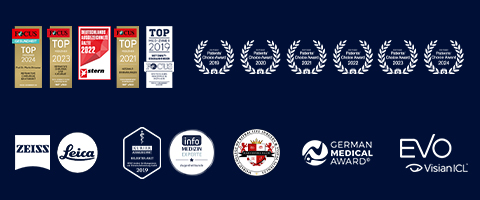Facts about Lens Implants
| Treatment Method: | Intraocular Lenses (ICL), Multifocal Lenses |
|---|---|
| Suitable For: | For refractive errors; individual suitability determined through a preliminary examination |
| Treatment Duration: | Approx. 10–15 minutes per eye |
| Anesthesia: | Locally anesthetic eye drops |
| Clinic Stay: | Outpatient |
| Aftercare: | Rest and protect the eyes from any contamination (water, sweat, etc.) for at least 1 week |
Besides laser eye treatment, lens implantation methods have proven to be another very gentle and highly precise procedure. They are placed directly in the eye through a minimally invasive treatment.
Lens implants are high-tech precision visual aids that enable a life without glasses or contact lenses. Whether farsightedness, nearsightedness, age-related changes, or a cornea that is too thin — lens implants can help almost every patient.
Depending on the type of refractive error or lens, it is decided where and how exactly the lens will be placed. This decision is made during a thorough preliminary examination at our clinics.
The following lens implantation procedures are performed at our clinic:

INTRAOCULAR LENSES (ICL)
A minimally invasive procedure that ensures rapid healing while preserving corneal stability.

MULTIFOCAL LENSES
In addition to treating cataracts, these lenses are also suitable for correcting high refractive errors and astigmatism.

Intraocular lenses (ICL)
Contact lenses inside the eye
- Procedure is minimally invasive
- Preservation of corneal stability
- Preservation of natural tear flow
- Reversible
- Good alternative to laser eye procedures
- Gentle and quick procedure
- Fast healing
- Possible for high refractive errors, thin corneas, or dry eyes
- Very well-tolerated material


Multifocal lenses
Refractive lens exchange
- Fast and gentle procedure
- Extensive experience
- Suitable even for high refractive errors and astigmatism
- Cataract treatment and prevention
- No more changes in the eye’s focusing power
- Lifelong freedom from glasses
- Sharp vision for near, far, and intermediate distances (e.g., computer use)

Treatment of Very High Prescriptions
Both supplementary phakic intraocular lenses (ICL) and refractive lens exchange using monofocal or trifocal premium lenses offer the possibility to correct high refractive errors.
Why only these 2 types of lenses?

Your eyes are an incredibly valuable asset. Being able to see clearly is a basic need that enables us to live safely. We appreciate and protect this 100%. The ICL lenses and multifocal lenses are the two medically approved lens types that provide the gentlest method, the fastest healing processes, and the best results. Of course, other factors such as experience and good management also play a role, and we work intensively on these every day.
As doctors, we are committed to always offering our patients only the absolute best that modern medicine has to offer.
Assoc. Prof. Dr. Martin Dirisamer
In addition, we actively participate in many research projects, continuously advance our education, and focus on a good patient-doctor relationship in which we openly share our views on the different products.
Please feel free to contact us for more details!
Frequently Asked Questions About Lens Implants
Who is suitable for lens implantation?
Lens implantation is suitable for almost any patient who desires a life without glasses or contact lenses. By implanting an artificial lens, extreme farsightedness (up to +10 diopters), extreme nearsightedness (up to -20 diopters), as well as astigmatism (up to 6 diopters), including combinations of these conditions, can be corrected.
What types of lens implants are there?
In our private ophthalmology practices in Linz and Vienna, we primarily use so-called Implantable Collamer Lenses (ICL) and multifocal lenses. The former are used to correct refractive errors without damaging the natural lens of the eye. The so-called multifocal lenses are mainly used for age-related farsightedness or cataracts. In these cases, the natural lens is removed and replaced with the lens implant.
How long do lens implants last?
Lens implants have a lifetime durability.
What should you keep in mind after a lens implantation?
After a lens implantation, you should rest for a few days. Additionally, you should protect your eyes from contamination for one week. For example, no water or sweat should get into your eyes.
How long does the implantation of lens implants take?
At our private ophthalmology clinics in Linz and Vienna, the implantation of a lens implant takes only about 10 to 15 minutes per eye.
Is the insertion of lens implants painful?
Before the lens implantation, we numb your eyes with special eye drops in our private ophthalmology clinics in Linz and Vienna. This ensures that the procedure is completely painless for you.
How much does lens implant surgery cost?
The costs for lens implants vary depending on the type of lens chosen and the treatment effort required. In a personal consultation, we will be happy to provide you with a detailed cost estimate at our private ophthalmology clinics in Linz and Vienna.
CONTACT
Ophthalmology Clinic Linz
Weissenwolffstraße 13, 3rd Floor
4020 Linz
Office Hours
Phone Consultation Hours
MON, WED, THU 09:00 AM – 6:00 PM
TUE 09:00 AM - 4:00 PM
FRI 09:00 AM – 12:00 PM
Appointment Days
By appointment only
Ophthalmology Clinic Vienna
Habsburgergasse 10, 4th Floor
1010 Vienna







